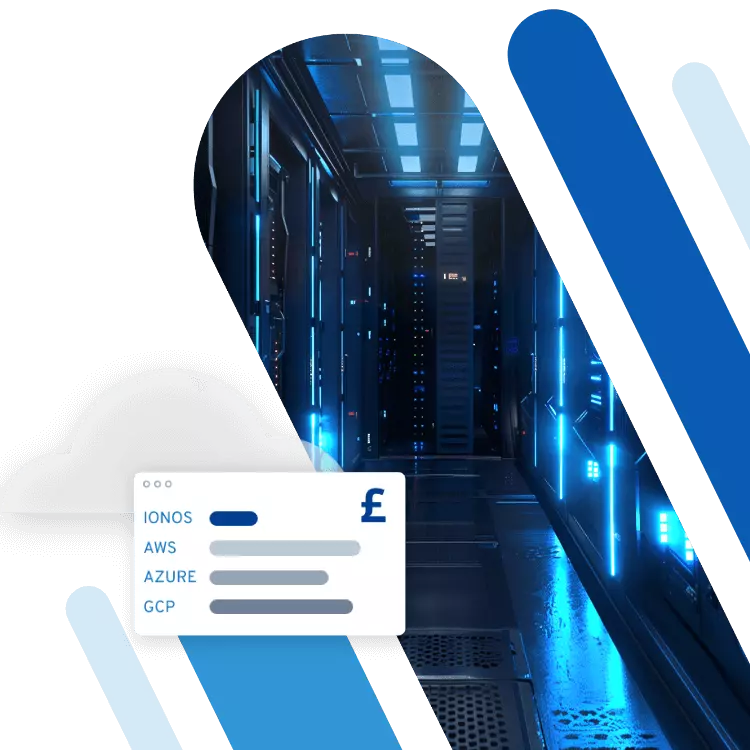What are the best Nextcloud alternatives?
There are numerous reasons why users opt for a Nextcloud alternative. Viable alternatives to Nextcloud are similarly high-performing open-source cloud solutions that offer comparable features and data protection compliant with GDPR for commercial use. We take a closer look at some alternatives – ownCloud, Seafile, Syncthing, SparkleShare and FileCloud – and let you know whether they pass the test.
What is Nextcloud?
Nextcloud is an open-source cloud solution with cloud storage and teamwork/groupware tools. It’s well suited to both private and business uses.
Some of the main strengths of the application are easy migration, a variety of Nextcloud apps, collaboration tools, role management and GDPR-compliant data security. Additional advantages include a large active community and the choice between independent self-hosting and managed hosting with secure host servers. This makes Nextcloud a solid free alternative to commercial providers such as Amazon AWS, Apple iCloud, Microsoft Onedrive and Google Drive.
What alternatives to Nextcloud are available?
There’s a wide selection of open-source solutions for free cloud software. Below we present five worthwhile Nextcloud alternatives.
| Provider | Advantages | Disadvantages | Target group | Compatible systems/clients for access to cloud |
|---|---|---|---|---|
| Nextcloud | Flexible and fast self-hosting with private servers or secure managed hosting with host servers, integrated collaboration tools with Nextcloud Hub, GDPR compliance, syncing across devices and group/user management | Somewhat involved installation for private users | Beginners and professionals | Windows, macOS, Linux, Unix, Android, iOS |
| ownCloud | Data syncing independent of device and location, simple role/group management, central file server with web interface, good Linux compatibility, reliable data security/encryption and security/compliance standards | Only server-side encryption, lower performance when saving multiple small files | Beginners and professionals | Windows, macOS, Linux, Android, iOS |
| Seafile | Simple installation, focus on file sharing and collaboration, team features like comments, file versions, messages | Better suited to file sharing than cloud computing, unresolved questions about data security | Beginners and professionals | Windows, macOS, Linux, Android, iOS, FreeBSD |
| Syncthing | Ideal for peer-to-peer synching, good web interface, data syncing using ID | No file system monitoring, syncing with Linux systems suboptimal, complicated | Advanced users and professionals | Windows, macOS, Linux, Android, iOS, Solaris, BSD |
| SparkleShare | Suitable for Linux system admins, Git version control, direct desktop integration | Restrictions on syncing, insufficient user/access control, complicated | Advanced users and professionals | Windows, macOS, Linux |
| Filecloud | Enterprise-oriented, focus on security, flexible, integration with existing software | Free version isn’t comprehensive | Advanced users and professionals | Windows, Linux, macOS, iOS, Android |
Accurate as of May 2023
ownCloud
The open-source solution ownCloud supports data syncing independent of device and location and allows for collaboration on files. As traditional private cloud software with practical features for cross-device team work in realtime, file sharing and central data storage, ownCloud is in the league of Microsoft 365 and iCloud while also enabling you to self-host. ownCloud is suitable for private users and for businesses with more than 25 employees. There is a free version available for private use. If you want access to the full features of the software, you’ll need to pay for a subscription.
The most important features:
- Central saving, editing and sharing of files and contents, regardless of location, time and device
- Comprehensive admin for creating groups, sharing files and managing access privileges
- Upload chunking for breaking up larger files into smaller parts
- Available with self-hosting or managed hosting
- Activities stream with an event log for each activity and each time a file is accessed
- Collaboration on office documents with Collabora Online, with support for Microsoft Office and LibreOffice
- File versions and optional file locking
- Comprehensive administrative access features
- Very good web interface
- Reliable data security for compliance and data protection
- Good compatibility with Linux-based systems
| Advantages | Disadvantages |
|---|---|
| Private cloud computing with self-hosting or managed hosting | A number of performance weaknesses when used on small systems or with many small files |
| Cross-platform data syncing including desktop clients and mobile apps | Irregular updates |
| Very good management of roles and access | - |
| Can easily be expanded on, thanks to its modular approach; numerous add-on apps and extensions on the ownCloud marketplace | - |
Seafile
Seafile is open-source software in the spirit of Dropbox, with an emphasis on file sharing and file transfers. Unlike Dropbox, it has open, unlicensed code on both server and client side. It’s especially strong when it comes to collaborative work on files and contents, with its practical commenting features, clear file versions, messaging and end-to-end client encryption. The software is available in free and professional versions.
The most important features:
- Central saving, editing and sharing of files and contents, regardless of location, time and device
- Practical file sharing and file transfers via central data storage on the cloud server
- Access to files for selected users with links
- File syncing and file versions
- Helpful collaborations tools for teams and projects (e.g. comments, messages)
| Advantages | Disadvantages |
|---|---|
| Good performance and fast file transfers | Unresolved questions surrounding data protection, since it is based in China (i.e. disclosure of user data) |
| Easy assignment of roles and access privileges | Focus on collaboration and data sharing, meaning cloud functionality is limited |
| Clients available for common systems and server compatibility for Raspberry Pi | - |
| Very easy setup | - |
Syncthing
Syncthing is an open-source solution for practical peer-to-peer file syncing. It doesn’t rely on cloud storage for syncing data and uses the internet instead. This means that files stay on users’ local devices but can still be updated and shared in realtime using device IDs.
In eliminating the cloud server, Syncthing provides one less opportunity for potential attacks. In addition, its practical web interface offers tools like user-defined assignment of access and privileges, folder integration and statistics. Additional devices can be added using the ID.
The most important features:
- Practical collaboration and realtime data syncing between computers using device IDs and the internet (peer-to-peer)
- Assignment of privileges and access to unlocked files and folders for selected users
- Helpful web interface for configuring roles, unlocking files or connecting additional devices
| Advantages | Disadvantages |
|---|---|
| Peer-to-peer syncing in realtime between devices without a cloud server | Connecting and syncing multiple devices is somewhat complicated |
| Practical web interface for admin and configuration settings, privileges and access | No file system monitoring |
| Connecting additional devices with an ID is no problem | Problems can arise with Linux-based systems |
SparkleShare
This open-source solution SparkleShare is focused on Linux, making it one of the preferred softwares for administrative management on Linux systems. SparkleShare can be used to sync files and store them centrally on a local or hosted server. Git version control ensures that files can be restored and changes can be tracked. That ensures that status of files is always clear, even when it comes to large projects with a lot of users with access. Since it’s based on Git, SparkleShare can also be seen as a graphic front end for Git.
The most important features:
- Centralised file sharing and encrypted syncing across devices
- Simple file restores and tracked changes with Git version control
- Easy desktop integration with a special directory for files and folders
| Advantages | Disadvantages |
|---|---|
| Fast, data syncing and collaboration across devices | Suboptimal client encryption (files names not encrypted on server) |
| Restore files and track changes with version control | Syncing for music and image files not optimal |
| Practical desktop integration with its own directory | Insufficient security measures (only one password that cannot be changed) |
| - | Relatively complicated with a focus on Linux |
FileCloud
FileCloud is open-source file sharing software that is mainly aimed at businesses. Its main focuses are on security, administrative management and compatibility. This alternative to NextCloud is very flexible and can be connected with popular programs and cloud services such as Microsoft Office, AWS and Google Workspace. The graphic interface can be individually configured (e.g. with your company’s logo). Data formats can be customised depending on the location of the end user. You can either self-host your FileCloud server or have FileCloud host it.
Admins can manage the access privileges of each individual device and also delete data from those devices remotely. You can also automate the deletion of private user data using FileCloud. If FileCloud is hosting your server, you can decide which country your data is saved in. That way you can ensure that personalised data are saved and deleted in compliance with the GDPR.
The most important features:
- Compatibility and syncing across devices
- Security: AES-256 encryption, SSL/TLS protocols and login with SSO and/or two-factor authentication available
- Flexible customisation of user interface and the option to self-host the server
- Wide-ranging integration with popular software packages and cloud services
- Simple and comprehensive management of device and files with several options of automation
- Unlimited versioning
| Advantages | Disadvantages |
|---|---|
| Unbeatable security, with comprehensive encryption and secure login settings | No free version for business customers, trial period only 15 days |
| Very flexible: customisable user interface, self-hosting or hosting by FileCloud | Primarily aimed at businesses, not suitable for private users |
| Integration: support for, e.g., AWS S3, Microsoft Office, Google Workspace, Digital Ocean and more | Not user-friendly |
| NTFS support: read, understand and transfer NTFS permissions to modernise legacy server and integrate with FileCloud | - |
| Compatibility: Apps for Windows, macOS, Linux, iOS and Android and numerous browser extensions; can be integrated as a network drive on Windows and macOS | - |
- Industry-leading security
- Communication and collaboration tools
- Hosted and developed in Europe

